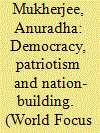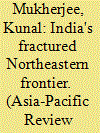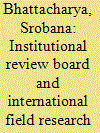|
|
|
Sort Order |
|
|
|
Items / Page
|
|
|
|
|
|
|
| Srl | Item |
| 1 |
ID:
136832


|
|
|
|
|
| Summary/Abstract |
Dr. B.R Ambedkar, the torchbearer of human rights established in the constitution of India was much more than a Dalit leader or an assiduous scholar or an eminent educationist through these and more are the various aspects of his versatile personality.
|
|
|
|
|
|
|
|
|
|
|
|
|
|
|
|
| 2 |
ID:
136835


|
|
|
|
|
| Summary/Abstract |
Dr. B.R. Ambedkar who is popularly known as Baba Saheb was the greatest of all social reformers, political thinkers, spiritual guides and emancipators of modern India. In fact, modern India began with his creation of state of India as well as the writing of the Constitution. If at all, the country had been organized with a single political string and woven with a common culture, language, habit, manner, behaviour and identity of the people, then, it was done only by Dr. Ambedkar
|
|
|
|
|
|
|
|
|
|
|
|
|
|
|
|
| 3 |
ID:
135898


|
|
|
|
|
| Summary/Abstract |
What explains the large variation in the time taken by states to ratify the 1948 Genocide Convention? The costs of ratification would appear to be relatively low, yet many states have waited several decades before ratifying this symbolically important treaty. This study employs a “nested analysis” that combines a large-n event history analysis with a detailed study of an important outlying case in order to explain the main sources of this variation. Surprisingly, the results of our event history analysis suggest that states do not become more likely to ratify once the treaty has become widely adopted by others. We use the case of Japan to examine this relationship in more detail. We argue that once the norm embodied in a human rights treaty develops a “taken-for-granted” character, the rate of ratification can slow down because the marginal costs of additional ratifications begin to outweigh the expected benefits
|
|
|
|
|
|
|
|
|
|
|
|
|
|
|
|
| 4 |
ID:
134490


|
|
|
|
|
| Summary/Abstract |
US–Brazilian relations sunk to one of their lowest points ever following last year's exposure of the US government's massive surveillance of the South American giant—including the correspondence of President Rousseff and the business operations of Brazil's national oil company, Petrobras. Brazilian authorities responded angrily. The Brazilian president called off a highly valued state visit to Washington, denounced the US for violations of sovereignty and human rights, and proceeded to bypass the US to purchase nearly $5 billion worth of fighter aircraft from Sweden. In fact, US–Brazil ties have not been constructive for more than a generation. Yes, relations are mostly amiable, but with limited cooperation, considerable discord and some open clashes. Washington views Brazil primarily as a regional actor, and wants its cooperation mainly on inter-American issues. For Brazil, regional collaboration means working with other Latin American nations—not the United States. Brazil usually wants the US to keep a distance from the region. The US is no more enthusiastic about Brazil assuming a global role; differences over some of the world's most dangerous political and security challenges have made Washington uneasy about Brazil's engagement in international affairs and critical of its foreign policy judgements. Relations will probably improve, but they could get worse. The two governments need to acknowledge that their relationship is fragile and troubled, and take steps both to rebuild trust and to avert further deterioration and new confrontations. They have to be more careful with each other.
|
|
|
|
|
|
|
|
|
|
|
|
|
|
|
|
| 5 |
ID:
135937


|
|
|
|
|
| Summary/Abstract |
The paper tries to analyze the different layers of the conflict in the remote Indian northeast. It looks at the different facets of this conflict, and argues that the conflict in the Indian northeast exists at many different levels. In relation to the different facets of the conflict, the paper has a special focus on human rights abuses, poverty, corruption, poor governance, administrative failure, the role played by external actors, and draconian laws such as the Armed Forces Special Powers Act. Most of the conflicts have been associated with strong separatist tendencies and the issue of migration. The levels of violence have differed from place to place within the region. While violence has been successfully dealt with by the Indian government in states like Mizoram, the situation in states like Assam, Manipur, and Nagaland seems to be a work in progress. Assam, Manipur, and Nagaland have witnessed very high levels of violence since 1947, when India became independent from British colonial rule, until the present day. Methodologically, the paper follows a bottom up approach, and, to get first-hand information about the conflict, a series of interviews was conducted recently with some of the local residents of the region. The paper suggests demilitarization and infrastructure development in the region as the way forward.
|
|
|
|
|
|
|
|
|
|
|
|
|
|
|
|
| 6 |
ID:
134803


|
|
|
|
|
| Summary/Abstract |
Research on political conflict can benefit immensely from fieldwork. However, the Institutional Review Board (IRB) process is elaborate and daunting that discourages rather than encourages this type of research. Existing policies often are insensitive to the many uncertainties related to field research abroad, especially in conflict zones. Three reasons for this are identified in this article. First, the federal regulations to protect human subjects of social science research are most suitable for biomedical sciences. Second, there is huge gap between “procedural ethics” and “ethics in practice.” Third, there is a lack of communication or dialogue between researchers and IRBs. After discussing these reasons, I offer the following suggestions: bridging the gap between the researcher and the IRB; reducing delays in the IRB approval and revision process; encouraging collaboration and dialogue among researchers; and advocating a proactive stance by academic associations.
|
|
|
|
|
|
|
|
|
|
|
|
|
|
|
|
| 7 |
ID:
136834


|
|
|
|
|
| Summary/Abstract |
Dr.Ambedkar a great intellectual, statesman, erudite scholar, institution-builder, socio-economic theorist and considered as one of the illustrious political personalities of modern India. He was also a great radical reformer and above all the liberator and saviour of the untouchables and backward class people of India. He initiated social revolution and secured social justice for those who had been denied basic rights of human beings for thousands of years.
|
|
|
|
|
|
|
|
|
|
|
|
|
|
|
|
| 8 |
ID:
136342


|
|
|
|
|
| Summary/Abstract |
IN MAY 2009, A TRUCK ROLLED THROUGH THE SHEIKH YASIN CAMP IN MARDAN, Pakistan’s “city of hospitality,” where thousands of people had fled following one of the country’s military offensives against the Taliban.
If water was a scarce commodity to this refugee community, ice was a luxury. And it was worth fighting for: A single block could refrigerate whatever perishables the displaced had secured for their families.
Over the past 10 years, Hungarian photojournalist Balazs Gardi has explored how something as basic as water has become a source of global conflict. But his work focuses on more than just environmental catastrophes and humanitarian challenges; exposing corporate interests—the massive bottled-
water industry and the plastic waste it creates—is another layer of his project. When it comes to water, he asks, “Who produces it?
Who owns it? And who profits from it?”
|
|
|
|
|
|
|
|
|
|
|
|
|
|
|
|
|
|
|
|
|